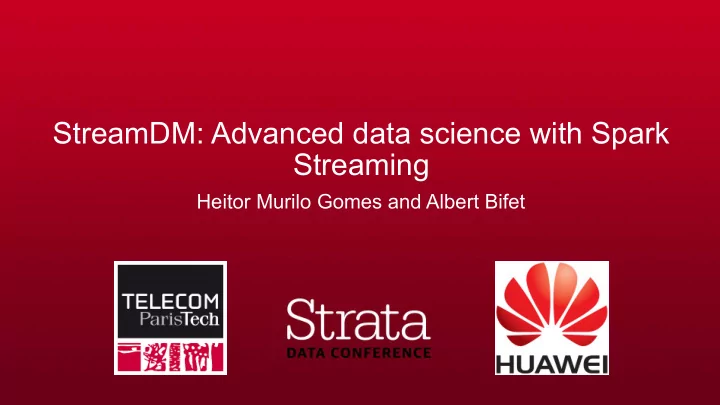

StreamDM: Advanced data science with Spark Streaming Heitor Murilo Gomes and Albert Bifet
About me � Heitor Murilo Gomes � PhD in Computer Science � Adaptive Random Forests for evolving data stream classification � A Survey on Ensemble Learning for Data Stream Classification � Researcher at Télécom ParisTech � Contribute to StreamDM and MOA � Website: www.heitorgomes.com � Linkedin: www.linkedin.com/in/hmgomes/
Topics � Batch learning X Stream learning - What is the difference? - What are the assumptions? � StreamDM - Overview of the project - Example of how to get started - Discussion about extending/using StreamDM � Wrap-up
Batch learning Well defined Challenges: training phase missing data, noise, imbalance, X 0 # X 1 # X 2 # high dimensionality, … ...# Random access to X 3 # X n # instances
Stream Learning Non-stationary Sequential access data distribution only Challenges: inherit those from batch + Strict time/memory concept drifts, requirements feature evolution, …
Training and Testing Batch Train data Test data � There are well-defined phases for training and validating your model � In production you deploy a trained model (perform predictions) Stream … � These phases are interleaved as the model and data (may) change over time � In production you deploy a trainable model (predictions + updates).
StreamDM: overview � Started in Huawei Noah’s Ark Lab � Collaboration between Huawei Shenzhen and Télécom ParisTech � Open source � Built on top of Spark Streaming � Does not depend on third-party libraries � Can be extended to included new tasks/algorithms � Website: http://huawei-noah.github.io/streamDM/ � GitHub: https://github.com/huawei-noah/streamDM
Spark Streaming � Micro-batch and Discretized Streams (DStream) Image source: https://databricks.com/blog/2015/07/30/diving-into-apache-spark-streamings-execution-model.html
StreamDM: micro-batches � Micro-batches and StreamDM � “So… you are not processing one instance at a time?!”
StreamDM � Stream readers/writers - Classes for reading data in and outputting results. � Tasks - Setting up the learning cycle (e.g. train/predict/evaluate). � Methods - Supervised and unsupervised learning algorithms. Hoeffding Tree, CluStream, Random Forest, Bagging, … � Base/other classes - Instance and Example representation, Feature specification, synthetic stream generators, parameter handling, …
StreamDM: Example � Task - Price change in electricity market modeled as binary classification (up/down) � Input - Simulated stream (file: electNormNew.arff) - it is available at the project git � Learner - Hoeffding Tree � Output - Basic classification performance per micro-batch
StreamDM: Example 1. git clone + sbt package https://github.com/huawei-noah/streamDM 2. cd /scripts and run this command line ./spark.sh "EvaluatePrequential -l (trees.HoeffdingTree) -s (FileReader -f ../data/ electNormNew.arff -k 4531 -i 45312) -e (BasicClassificationEvaluator -c -m) -h" 1> results_ht.csv � Getting started guide: http://huawei-noah.github.io/streamDM/docs/GettingStarted.html
Demo
StreamDM: Example ./spark.sh " EvaluatePrequential -l ( trees.HoeffdingTree ) -s ( FileReader -f ../data/electNormNew.arff -k 4531 -i 45312) -e ( BasicClassificationEvaluator -c -m) -h" 1> results_ht.csv
Task - Evaluate Prequential class EvaluatePrequential extends Task { /* attributes */ def run(ssc:StreamingContext): Unit = { val reader:StreamReader = this .streamReaderOption.getValue() val learner:Classifier = this .learnerOption.getValue() learner.init(reader.getExampleSpecification()) val evaluator:Evaluator = this .evaluatorOption.getValue() evaluator.setExampleSpecification(reader.getExampleSpecification()) val writer:StreamWriter = this .resultsWriterOption.getValue() val instances = reader.getExamples(ssc) if (shouldPrintHeaderOption.isSet) writer.output(evaluator.header()) //Predict val predPairs = learner.predict(instances) //Train learner.train(instances) //Evaluate writer.output(evaluator.addResult(predPairs)) } }
Task - Evaluate Prequential class EvaluatePrequential extends Task { /* attributes */ def run(ssc:StreamingContext): Unit = { val reader:StreamReader = this .streamReaderOption.getValue() val learner:Classifier = this .learnerOption.getValue() learner.init(reader.getExampleSpecification()) val evaluator:Evaluator = this .evaluatorOption.getValue() evaluator.setExampleSpecification(reader.getExampleSpecification()) val writer:StreamWriter = this .resultsWriterOption.getValue() val instances = reader.getExamples(ssc) if (shouldPrintHeaderOption.isSet) writer.output(evaluator.header()) //Predict val predPairs = learner.predict(instances) //Train learner.train(instances) //Evaluate writer.output(evaluator.addResult(predPairs)) } }
Task - Evaluate Prequential class EvaluatePrequential extends Task { /* attributes */ def run(ssc:StreamingContext): Unit = { StreamReader val reader:StreamReader = this .streamReaderOption.getValue() val learner:Classifier = this .learnerOption.getValue() learner.init(reader.getExampleSpecification()) Learner val evaluator:Evaluator = this .evaluatorOption.getValue() evaluator.setExampleSpecification(reader.getExampleSpecification()) Evaluator val writer:StreamWriter = this .resultsWriterOption.getValue() val instances = reader.getExamples(ssc) StreamWriter if (shouldPrintHeaderOption.isSet) writer.output(evaluator.header()) //Predict val predPairs = learner.predict(instances) //Train learner.train(instances) //Evaluate writer.output(evaluator.addResult(predPairs)) } }
Task - Evaluate Prequential class EvaluatePrequential extends Task { /* attributes */ def run(ssc:StreamingContext): Unit = { val reader:StreamReader = this .streamReaderOption.getValue() val learner:Classifier = this .learnerOption.getValue() learner.init(reader.getExampleSpecification()) val evaluator:Evaluator = this .evaluatorOption.getValue() evaluator.setExampleSpecification(reader.getExampleSpecification()) val writer:StreamWriter = this .resultsWriterOption.getValue() val instances = reader.getExamples(ssc) Receive if (shouldPrintHeaderOption.isSet) writer.output(evaluator.header()) Output Predict //Predict val predPairs = learner.predict(instances) //Train learner.train(instances) Train //Evaluate writer.output(evaluator.addResult(predPairs)) } }
Learner - Hoeffding Tree � Incremental Decision Tree learning algorithm � Hoeffding trees are the cornerstone of supervised learning for data streams � Used (a lot) to build ensemble models � StreamDM implementation - horizontal partitioning - handle numeric and nominal features - binary / multi-class - Naive bayes at leaves � Theoretical details: Mining High-Speed Data Streams by Pedro Domingos and Geoff Hulten
Output - Basic Classification Performance � Outputs different metrics (e.g. accuracy, fbeta-score, …) � Binary and multi-class evaluation per micro-batch
StreamDM, MLlib and MOA � Using Hoeffding Tree as a MLlib streaming algorithm � For the same electricity data - StreamingLogisticRegressionWithSGD - Hoeffding Tree (StreamDM) - Hoeffding Tree (MOA) � Implementation: - From Example to LabeledPoint - “Schema” specification - Adhering to coding standard
Wrap-up � Brief overview of learning from data streams � How to set up StreamDM (you should try it out in your own data) � Basic concepts of how to extend StreamDM - Adding new tasks/methods - Using it in your code � If you develop something please consider contributing it to StreamDM
Upcoming � More supervised learning algorithms (e.g. Random forest) � Task and algorithms for pattern mining, multi-label and concept drift detection � StreamDM + Structured Streaming (Strata NY 2018) - Machine learning for non-stationary streaming data using Structured Streaming and StreamDM
Thanks! https://github.com/huawei-noah/streamDM
Recommend
More recommend